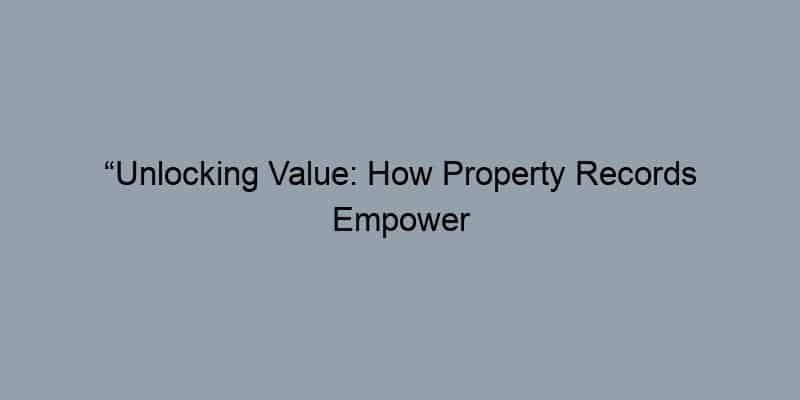In the world of real estate, having the right information can make all the difference in closing a deal. One of the most valuable resources at a realtor’s disposal is property records. These records can provide crucial insights that not only help realtors do their jobs better but also benefit home buyers and sellers immensely. Understanding what property records are and how they can aid in real estate transactions will give you an edge whether you are selling your home, buying one, or working in real estate.
What Are Property Records?
Property records are documents that provide essential information about a piece of real estate. They typically include details such as ownership history, property tax information, sales history, and any existing liens or mortgages on the property. These records are usually maintained by local government offices, like county clerks or assessor’s offices.
Why Are Property Records Important?
For home buyers, sellers, and realtors, having access to property records is vital. Here’s why:
-
Transparency: Knowing the history of a property can bring peace of mind. Buyers can learn if there have been issues like previous foreclosures or legal problems.
-
Negotiation Power: Sellers can assess comparable sales in their area to set a competitive price. Buyers can use this information to make informed offers.
-
Identifying Fair Market Value: Both parties can gain insights into the value of the property based on its history and current market trends.
-
Understanding Obligations: Homeowners can find any liens or loans associated with the property that might complicate a sale.
Key Information
- Property records provide essential information about real estate.
- They enhance transparency and negotiation power for the buyer and seller.
- Real estate agents can use property records to close deals faster by having comprehensive knowledge of a property.
- Homeowners and prospective buyers can understand a property’s history, taxes, and obligations.
Why You Need a Comprehensive Property Record
A comprehensive property record can help you with various facets of real estate, including:
1. Finding Home Values
When you have the property record in hand, you can see how much similar homes in the area have sold for. This information helps buyers argue for fair pricing and assists sellers in setting a reasonable price.
Example: Imagine you are selling your home, and the property record shows that similar homes sold for $350,000 in the last six months. This knowledge can guide you in establishing your asking price, helping you attract serious buyers.
2. Sales History
Property records reveal how many times a property has changed hands and at what prices. This history can indicate whether a property has appreciated over time, which is a significant factor for homebuyers.
Example: If a property has sold multiple times in a short period, the buyer might want to investigate why. It could be a red flag concerning the home’s condition or neighborhood.
3. Tax Records
Tax assessments included in property records indicate how much a homeowner pays in property tax, which can affect your monthly mortgage payment if you are buying.
Example: Knowing that property taxes have increased can help buyers anticipate and budget for additional costs after purchase.
4. Mortgages and Liens
Understanding existing mortgages or liens on a property is crucial. These obligations must be resolved before a property can successfully change hands.
Example: If a property record reveals an outstanding mortgage, a buyer knows they must negotiate with the seller to settle that debt before the sale can proceed.
5. Homeowner Information
For realtors, having access to homeowner information, such as previous ownership, can aid in targeting potential sellers or buyers more effectively.
Example: If you have a list of homeowners in a neighborhood, you can reach out to those who may be looking to sell based on market trends.
FAQs
1. What types of information are included in a property record?
A property record typically includes ownership history, sales history, property tax assessments, mortgages, and liens.
2. How do I access property records?
Property records can often be accessed through local government offices, county clerks, or online databases like OfficialPropertyRecords.org.
3. Are property records only for realtors?
No, property records are valuable for anyone involved in real estate, including home buyers, sellers, and even investors.
4. Can property records help me negotiate a better price?
Absolutely! Knowing the sales history and market trends allows you to make informed decisions when negotiating.
5. How can I trust the information in property records?
Local government offices are responsible for maintaining accurate property records, and reviewing records through a reputable service like OfficialPropertyRecords.org can ensure you’re getting reliable information.
Conclusion
In the competitive world of real estate, knowledge is power. Comprehensive property records serve as an invaluable resource for home buyers, sellers, and realtors alike. They provide essential details about a property that can make the buying or selling process faster and smoother.
If you’re serious about buying, selling, or simply want more information regarding a property, consider obtaining a comprehensive property record from OfficialPropertyRecords.org. Access to this information can empower you to make informed decisions and ultimately unlock greater value in your real estate experience.

